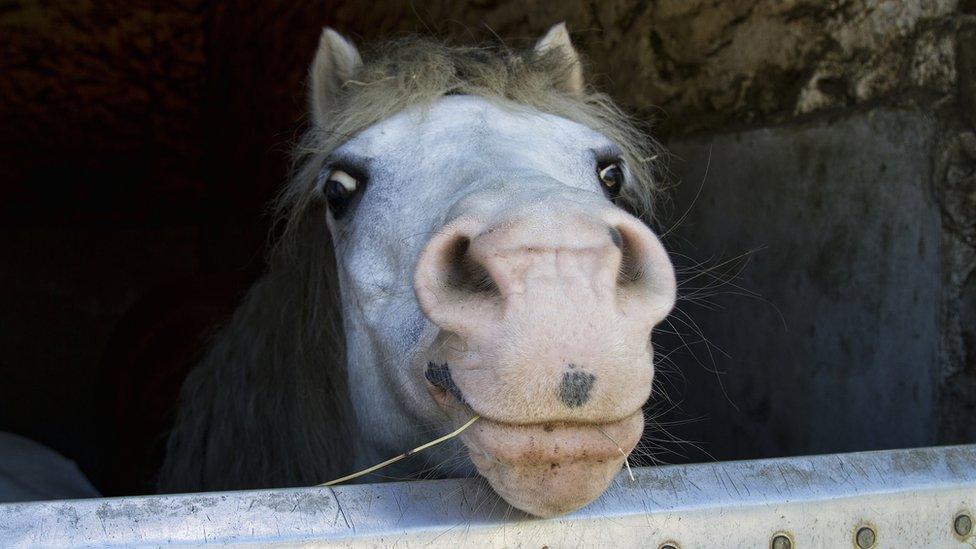Horse sense: Happiest equines love to snort, says study
- Published

Scientists haven't given too much attention to the significance of horse snorting before now.
The expulsion of air through the equine nose has normally been connected with "clearing phlegm, flies or other irritants".
But now researchers in France say that these blow-outs are a key indicator of what's going on in the equine mind.
They found horses living in relaxed environments produced far more snorts than those in stressful conditions.
Why the long face?
Understanding when a horse is feeling happy, scientifically, is quite difficult. Cats are easy by comparison; their purring is a clear sign of contentedness.
Horses give off conflicting signals - their heart rates increase at the anticipation of food, but decrease during grooming, something that humans generally believe they enjoy.
Some people believe that horses being playful are showing they are happy. But researchers say that this isn't always the case, as play can be a "coping mechanism" when horses are faced with unexpected events, and it may also be a way of reducing social tension in the group.
In this study, the scientists wanted to test the anecdotal idea that snorting in horses occurs more often in positive situations.
So what exactly is a snort?
Experts say that horses produce three different non-vocal sounds, all by passing air through their large nostrils. Who knew?
Snores are very short raspy sounds produced when a horse is examining something new. Blows are described as short and very intense exhalations and are associated with vigilance or alarm.
The fully fledged snort though is a bit different - it's a pulsed sound produced by nostril vibrations when expelling air.
How do you test snorting in horses?
With a great deal of patience!
In this study, researchers examined horses in riding schools and those kept in naturalistic conditions. The horses in the riding schools were kept in small stalls and were ridden for 4-12 hours a week under the supervision of a riding teacher. They were allowed out on grass for differing but limited amounts of time.
In contrast the horses kept in natural conditions lived in small groups on pasture and were occasionally used for relaxed outdoor leisure riding.
The scientists stared at the horses for five minutes and recorded the snorting activities of all groups and also noted what they were doing and the position of their ears - backward pointing ears is associated with negative emotional states in horses while forward pointing are seen as an indication of positive feelings.
What did they conclude?
Horses snorted far more when they were out in pasture than when they were in a stall. Among riding school horses, snorts occurred at a rate of around five per hour which was about half of what the horses in naturalistic conditions produced. These were also correlated with positive behaviours such as ears pointing forward. When the researchers looked at other measures of welfare and stress they concluded that "the more snorts emitted the more they were in a good welfare state".
The riding school animals also produced more snorts during their limited time out in pasture. No animal was recorded snorting when it was being aggressive. Eight horses in the stalls produced no snorts while they were being monitored.
Horses in riding schools stalls didn't snort as much, while some didn't snort at all
So how will this improve horse welfare?
The authors believe that the study shows that snorts are about far more than horses clearing their noses!
"The snort is associated with more positive contexts (in pasture, in feeding) in horses," said lead author Dr Mathilde Stomp from the University of Rennes in France.
"It is less frequent in horses showing an altered welfare. Snorts appear as a possible reliable indicator of positive emotions which could help identify situations appreciated by horses."
The in the journal PLOS ONE.